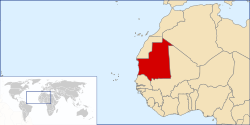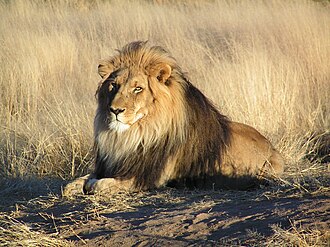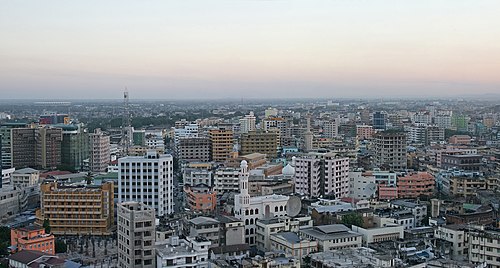Portal:Africa



Africa is the world's second-largest and second-most populous continent after Asia. At about 30.3 million km2 (11.7 million square miles) including adjacent islands, it covers 20% of Earth's land area and 6% of its total surface area. With nearly 1.4 billion people as of 2021, it accounts for about 18% of the world's human population. Africa's population is the youngest among all the continents; the median age in 2012 was 19.7, when the worldwide median age was 30.4. Based on 2024 projections, Africa's population will exceed 3.8 billion people by 2100. Africa is the least wealthy inhabited continent per capita and second-least wealthy by total wealth, ahead of Oceania. Scholars have attributed this to different factors including geography, climate, corruption, colonialism, the Cold War, and neocolonialism. Despite this low concentration of wealth, recent economic expansion and a large and young population make Africa an important economic market in the broader global context, and Africa has a large quantity of natural resources.
Africa is highly biodiverse; it is the continent with the largest number of megafauna species, as it was least affected by the extinction of the Pleistocene megafauna. However, Africa is also heavily affected by a wide range of environmental issues, including desertification, deforestation, water scarcity, and pollution. These entrenched environmental concerns are expected to worsen as climate change impacts Africa. The UN Intergovernmental Panel on Climate Change has identified Africa as the continent most vulnerable to climate change.
The history of Africa is long, complex, and varied, and has often been under-appreciated by the global historical community. In African societies the oral word is revered, and they have generally recorded their history via oral tradition, which has led anthropologists to term them "oral civilisations", contrasted with "literate civilisations" which pride the written word. African culture is rich and diverse both within and between the continent's regions, encompassing art, cuisine, music and dance, religion, and dress.
Africa, particularly Eastern Africa, is widely accepted to be the place of origin of humans and the Hominidae clade, also known as the great apes. The earliest hominids and their ancestors have been dated to around 7 million years ago, and Homo sapiens (modern human) are believed to have originated in Africa 350,000 to 260,000 years ago. In the 4th and 3rd millennia BCE Ancient Egypt, Kerma, Punt, and the Tichitt Tradition emerged in North, East and West Africa, while from 3000 BCE to 500 CE the Bantu expansion swept from modern-day Cameroon through Central, East, and Southern Africa, displacing or absorbing groups such as the Khoisan and Pygmies. Some African empires include Wagadu, Mali, Songhai, Sokoto, Ife, Benin, Asante, the Fatimids, Almoravids, Almohads, Ayyubids, Mamluks, Kongo, Mwene Muji, Luba, Lunda, Kitara, Aksum, Ethiopia, Adal, Ajuran, Kilwa, Sakalava, Imerina, Maravi, Mutapa, Rozvi, Mthwakazi, and Zulu. Despite the predominance of states, many societies were heterarchical and stateless. Slave trades created various diasporas, especially in the Americas. From the late 19th century to early 20th century, driven by the Second Industrial Revolution, most of Africa was rapidly conquered and colonised by European nations, save for Ethiopia and Liberia. European rule had significant impacts on Africa's societies, and colonies were maintained for the purpose of economic exploitation and extraction of natural resources. Most present states emerged from a process of decolonisation following World War II, and established the Organisation of African Unity in 1963, the predecessor to the African Union. The nascent countries decided to keep their colonial borders, with traditional power structures used in governance to varying degrees. (Full article...)
Selected article –

The Niger women's national football team represents Niger in international women's football. It is governed by the Nigerien Football Federation. It has played in four FIFA-recognised matches, two of which were losses to Burkina Faso women's national football team in 2007. There is an under-20 women's national team who were supposed to participate in the 2002 African Women U-19 Championship but withdrew before playing a game. Some problems impact the development of the women's game in Africa that effect Niger of which sexism, abuse, homophobia, religion and financial setbacks have been huge factors. (Full article...)
Featured pictures –
Did you know (auto-generated) -

- ... that Jane C. Beck traveled to Virginia, West Africa, and England to research the family history of Daisy Turner for her 2015 book Daisy Turner's Kin: An African American Family Saga?
- ... that the growth of Christianity in 20th-century Africa has been termed the "fourth great age of Christian expansion"?
- ... that one way to tell the African dusky flycatcher apart from the ashy flycatcher is that the former is "cuter"?
- ... that the Philippine embassy in Pretoria responded to a South African newspaper's denunciation of horse fighting in the Philippines by saying that the practice was already illegal?
- ... that activist Gerlin Bean co-founded the Organisation of Women of African and Asian Descent in 1978, an event described as "a watershed in the history of Black women's rights activism"?
- ... that Muhsin Hendricks of South Africa has been described as "the world's first openly gay imam"?
Categories
Selected biography –
Paul Kagame (/kəˈɡɑːmeɪ/ ⓘ kə-GAH-may; born 23 October 1957) is a Rwandan politician and former military officer who has been the President of Rwanda since 2000. He was previously a commander of the Rwandan Patriotic Front (RPF), a rebel armed force which invaded Rwanda in 1990. The RPF was one of the main belligerents of the Rwandan Civil War and was the armed force which ended the 1994's Rwandan genocide. He was since considered Rwanda's de facto leader while Vice President and Minister of Defence under President Pasteur Bizimungu, up to his 2000's election as Rwanda's 4th president and the abolition of the vice-presidential position.
Born to a Tutsi family in southern Rwanda that fled to Uganda when he was two years old, Kagame spent the rest of his childhood there during the Rwandan Revolution, which ended Tutsi political dominance. In the 1980s, Kagame fought in Yoweri Museveni's rebel army becoming a senior Ugandan army officer after many military victories led Museveni to the Ugandan presidency. Kagame joined the RPF, taking control of the group when previous leader Fred Rwigyema died on the second day of the 1990 invasion. By 1993, the RPF controlled significant territory in Rwanda and a ceasefire was negotiated. The assassination of Rwandan President Juvénal Habyarimana set off the genocide, in which Hutu extremists killed an estimated 500,000 to 800,000 Tutsi and moderate Hutu. Kagame resumed the civil war and ended the genocide with a military victory. (Full article...)
Selected country –
 |
 |
||

| |||
Mauritania (Arabic: موريتانيا Mūrītāniyā), officially the Islamic Republic of Mauritania, is a country in northwest Africa. It is bordered by the Atlantic Ocean on the west, by Senegal on the southwest, by Mali on the east and southeast, by Algeria on the northeast, and by the Moroccan-annexed territory of Western Sahara on the northwest. It is named after the ancient Berber kingdom of Mauretania. The capital and largest city is Nouakchott, located on the Atlantic coast.
Approximately three-fourths of Mauritania is desert or semidesert. As a result of extended, severe drought, the desert has been expanding since the mid-1960s. A majority of the population still depends on agriculture and livestock for a livelihood, even though most of the nomads and many subsistence farmers were forced into the cities by recurrent droughts in the 1970s and 1980s. Mauritania has extensive deposits of iron ore, which account for almost 50% of total exports. The nation's coastal waters are among the richest fishing areas in the world, but overexploitation by foreigners threatens this key source of revenue. (Read more...)
Selected city –
Beira (Portuguese pronunciation: [ˈbejɾɐ]) is the capital and largest city of Sofala Province, in the central region of Mozambique.
Beira is where the Pungwe River meets the Indian Ocean. It is the fourth-largest city by population in Mozambique, after Maputo, Matola and Nampula. Beira had a population of 397,368 in 1997, which grew to 530,604 in 2019. A coastal city, it holds the regionally significant Port of Beira, which acts as a gateway for both the central interior portion of the country as well as the land-locked nations of Zimbabwe, Zambia and Malawi. (Full article...)
In the news
- 10 April 2025 – Land reform in Zimbabwe
- Zimbabwe begins issuing the first financial compensation payments to White Zimbabwean farmers whose farms were seized by Robert Mugabe's government between 2000 and 2002. A total of 740 farmers will be compensated as per the 2020 agreement with the Commercial Farmers' Union. (BBC News)
- 8 April 2025 –
- The death toll from the heavy flooding in Kinshasa, Democratic Republic of the Congo, caused by overflow of the Ndjili River increases to 33 deaths. Hundreds of buildings are completely submerged and thousands of people are trapped in their homes. (NPR) (DW)
- About 50 hippos are killed by anthrax poisoning at Virunga National Park in the Democratic Republic of the Congo. (CTV News)
- 8 April 2025 – 2024 Democratic Republic of the Congo coup attempt, Democratic Republic of the Congo–United States relations
- Three U.S. citizens have their sentences for attempting a coup against the Congolese President Félix Tshisekedi in 2024 commuted and are extradited back to the United States. They were previously sentenced to death along with 34 others for the failed attempt that killed six people, including the coup's leader Christian Malanga. (NPR)
- 7 April 2025 – Herder–farmer conflicts in Nigeria
- The National Emergency Management Agency reports that at least 52 people have been killed and over 2,000 others have been displaced from their homes in recent days in tit for tat attacks by rival herders over control of arable land in Plateau State, Nigeria. (Reuters)
- 7 April 2025 – Algeria–Mali relations
- Algeria bans flights to and from Mali in response to "recurrent violations" of Algerian airspace by Malian military drones. (Reuters)
Updated: 23:05, 11 April 2025
General images -
Africa topics
More did you know –
- ... that at approximately 5,000 years old, the Lothagam North Pillar Site is thought to be the earliest and largest monumental cemetery in eastern Africa?
- ... that a 2020 study found that African countries which allowed foreign funding of NGOs had a higher voter turnout?
- ... that Essop Moosa, who was of Indian origin, became the first non-white player to play for an all-white soccer team in South Africa, appearing under a pseudonym?
- ... that the Seventh German Inner Africa Research Expedition served as cover for a secret First World War espionage mission?
Related portals
Major Religions in Africa
North Africa
West Africa
Central Africa
East Africa
Southern Africa
Associated Wikimedia
The following Wikimedia Foundation sister projects provide more on this subject:
-
Commons
Free media repository -
Wikibooks
Free textbooks and manuals -
Wikidata
Free knowledge base -
Wikinews
Free-content news -
Wikiquote
Collection of quotations -
Wikisource
Free-content library -
Wikispecies
Directory of species -
Wikiversity
Free learning tools -
Wikivoyage
Free travel guide -
Wiktionary
Dictionary and thesaurus



























































































